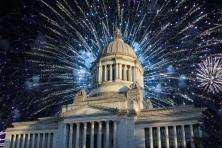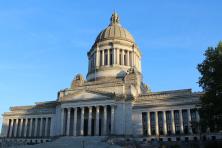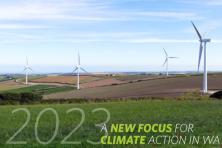Back in 2018, Climate Solutions’ then Washington Director Vlad Gutman-Britten wrote:
“Our Washington State Legislature didn’t get the job done on climate, again. It still seems that, no matter the urgency of the issue, or the intensity of the consensus on the need to act, and no matter who runs the place, Olympia just can’t get it together to challenge our fossil-fueled status quo.”
But we persevered, got stronger together, and came back year after year to pass nation-leading climate policy. It’s incredible to reflect back on that quote from four years ago. Since then, we’ve made historic progress on climate action in Washington. We are on a pathway to 100% clean electricity; our transition to electric vehicles and clean fuels is now inevitable; and we have an economy-wide emissions cap that requires our largest polluters to reduce greenhouse gas pollution by 95%. This has been a transformational shift—and it’s necessary. The latest report from the Intergovernmental Panel on Climate Change notes that we are approaching a tipping point; we must make this our decade of action if humankind is to succeed in turning things around before it is too late.
That broader time horizon is our context as we review what happened this session. This year, the Washington Legislature built upon the transformational shift we’ve begun in recent years; lawmakers took important steps in a few key areas, but hesitated in others. Washingtonians will now have greater access to a clean transportation system, will breathe easier as a result of significant investments in transportation electrification, will enjoy greater access to clean energy jobs in our state, and will benefit from reducing powerful methane pollution from our landfills. But we also have more work to do to clean up our building emissions—our fastest growing source of harmful pollution.
Here is a summary of the climate successes, and unfortunate retreats, of the 2022 legislative session.
Clean transportation
Our biggest climate win is the Legislature passing a historic transportation package (SB 5974/HB 2119) that invests over $5 billion from the Climate Commitment Act in more transit, transportation electrification, bike and pedestrian infrastructure, ferry electrification, and more! This is a fundamental shift (and huge win) in how Washington has previously funded and invested in transportation, significantly increasing everyone’s access to a less polluting transportation system that will vastly improve our health, provide more ways to get around in our communities, and cut major sources of pollution. Transportation is still Washington’s largest source of climate and toxic air pollution, and these investments are a significant step forward for our climate and communities.
The Legislature also invested $69 million in EV charging infrastructure in this year’s budget, and removed homeowners associations’ ability to prohibit chargers (HB 1793), which will greatly improve drivers’ ability to charge where they live all across Washington. But we will need to do more. With such high levels of pollution, there is still significant work to do to ensure that our largest vehicles—such as trucks and buses—can transition faster to cleaner fuels like electricity as well.
Siting and Jobs
As we transition off of fossil fuels, Washington must replace its expansive fossil fuel infrastructure with clean energy solutions. The passage of clean energy siting bill HB 1812 will more easily allow us to bring new clean energy facilities (and their associated local jobs) to our state, paired with a broad array of incentives for all types of clean energy projects (HB 1988, SB 5910, and others) that will help make Washington a true leader in clean energy technology. These bills mean that as we make the transition to clean energy, we can and will create good jobs in the process here at home.
Methane pollution
Solid waste landfills emit a significant amount of methane pollution—80 times more harmful to our climate than carbon dioxide—as well as other harmful pollutants that cause major health problems. HB 1799 and HB 1663 will cut methane emissions by setting a statewide target for diverting organic material and requiring landfills to capture methane onsite. Both of these are key strategies for reducing methane emissions and improving air quality in our communities.
Clean Buildings
Even though buildings are the largest growing source of emissions in Washington, the Legislature holistically failed to advance policy to ensure that our homes and buildings transition away from fossil fuels. While there were some small wins for the people (SB 5722 and HB 1280), blatant misinformation from the gas industry and the building industry stalled meaningful progress.
The failed bill HB 1767 would have increased customer choice by allowing public utilities to help customers transition off of fossil fuels to clean, efficient electric heating systems, and HB 1770 would have given local jurisdictions necessary tools to make sure that new homes and residential buildings are clean and efficient. Both of these bills were no-brainers—optional actions that would have allowed customers and local jurisdictions to reduce our reliance on fossil fuels. But the gas industry sees any clean buildings legislation as a threat to their business, and is digging in against buildings efforts across the region and the country with misinformation and organized lobbying promoting “clean” fossil fuels. In 2023, our Legislature must be bold and prioritize the health and safety of Washingtonians and ensure that everyone can live, work, learn and play in clean homes and buildings.
The urgency of the climate crisis requires bold and meaningful action every single year; we don’t have time for breaks. Onward to continued climate leadership and progress in 2023.





